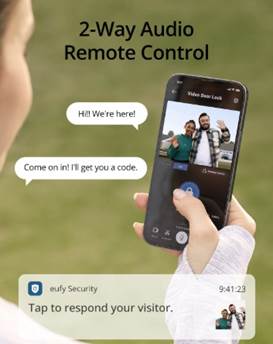Smart locks are transforming
home security. These gadgets include advanced functions in addition to
lock-and-key systems. Smart locks, which use wireless connectivity and
user-specific access controls, allow homeowners to manage home security.
Allowing temporary access and monitoring entrance records increases users'
control, flexibility, and peace of mind. Whether it’s for
daily convenience or enhanced protection, smart door locks deliver a new standard in residential
safety. This blog explores what makes smart locks revolutionary, their key
benefits, and essential considerations before installing one.

What Makes Smart
Locks a Game Changer in Home Security?
Remote Access and
Real-Time Monitoring
Remote access allows smartphone users to lock and
unlock doors from anywhere. This functionality is required to allow relatives,
friends, and service providers to enter without making physical contact.
Real-time notifications and surveillance inform homeowners about who comes and
goes. If an unauthorized attempt is made, the system will inform you
immediately. Constant inspection lowers security gaps by providing information
and control. It works with cameras and alarms to provide a complete picture of
household activities, turning the lock into a proactive security tool.
Elimination of
Physical Keys
Physical keys that have been lost, cloned, or stolen
are considered a liability. Smart locks replace keys with PINs, biometrics, or
mobile apps, thereby reducing this risk. Homeowners no longer have to hide
spare keys or worry about copies. Users can create and delete digital access as
needed, which adds convenience and security. Some types automatically lock when
you leave, preventing your home from being left alone. Key elimination reduces
risk and streamlines daily routines, making secure access faster and more
efficient.
Integration With
Smart Home Systems
Alexa, Google Home, and Apple HomeKit work well with
smart locks. Voice, scene, and centralized control from one app are possible
with these integrations. Door locks switch off lights and change the
temperature to save electricity. Interconnectedness boosts security and
usability. Home security can be automated by synchronizing devices. The Video
Smart Lock S330 provides improved locking and real-time video verification for
smart home installations.

Key Benefits of
Switching to Smart Locks
Enhanced Control
and Access Logs
Smart locks track house guests and timings. This
function is ideal for keeping track of household members, guests, and
maintenance personnel. When a code or app unlocks the door, homeowners receive
immediate notifications. In contrast to locks, it reduces uncertainty and
offers digital responsibility. The data can also help identify unusual patterns
or illegal entries. This increased visibility gives users power and reassurance
while keeping them informed about home security.
Customizable
Access for Family and Guests
Smart locks allow homeowners to create several access
codes with user-specific rights. Parents can set permanent codes for their
children as well as temporary codes for guests or service staff. Access can be
limited by the day or hour, and codes can be cancelled instantly. This flexible
control ensures that no one has unnecessary or lingering access. Airbnb owners
and landlords who need to change guest access will enjoy it. Customization
enhances security and convenience over handing out and tracking physical keys.
Increased
Protection Against Lock Picking
Traditional locks are vulnerable to bumping and
picking, two popular methods employed by attackers. By replacing mechanical
keyholes with digital authentication, smart locks eliminate these weaknesses.
Hacking a lock that lacks a cylinder is nearly impossible. Many smart locks
provide tamper detection alarms. Some include anti-peep keypads to prevent code
theft. These features protect against break-ins and respond to threats.
Homeowners can improve their home security and prevent forced entry by upgrading
to smart locks.
What to Consider
Before Installing a Smart Lock?
Battery Life and
Power Backup
Smart locks are battery-powered. Before installing, be
sure you choose devices with long-lasting batteries and obvious low-battery
warnings. Some use rechargeable batteries, while others employ AA or CR123
cells. Many gadgets provide mechanical key override or USB emergency power
connectors as a backup. Your smart lock should not fail during a power outage
or when you are away. Select a model with effective power management and clear
status notifications to minimize sudden battery drain or shutdown.
Compatibility With
Your Door and Deadbolt
Not every smart lock fits every door. Before
purchasing, ensure that the lock's thickness, deadbolt type, and orientation
are appropriate for your door. Some types use only single-cylinder deadbolts,
while others replace the lock mechanism. You will also require internal and
exterior component clearance around the lock. Retrofit options that employ
existing gear may be preferable for renters or those who want a simple
installation. Making accurate measurements and checking product specifications
can help you avoid installation issues and ensure a secure, smooth fit for your
home.
Security Standards
and Encryption
Smart locks should use AES-128 or AES-256 encryption
and have ANSI/BHMA certification. These procedures prevent hacking and
spoofing. Look for locks that support two-factor authentication and encrypted
app-lock communication. Regular firmware updates help to repair
vulnerabilities, so consider products that do. Security certification from
reliable third parties increases legitimacy. Choosing robust digital security
ensures that your smart lock combats both physical and cyber threats, providing
you with peace of mind that your home is secure.
Conclusion
Smart locks are an excellent addition to increased
home security, access control, and modern convenience. They outperform
traditional locks by offering remote monitoring, code-based entry, and smart
home integration. Choosing the right model entails ensuring battery economy,
door compatibility, and security compliance, but the benefits typically
outweigh the costs. As technology progresses, smart locks continue to be among
the top solutions for home security and access control. Accept innovation and
begin living smarter and safer.
